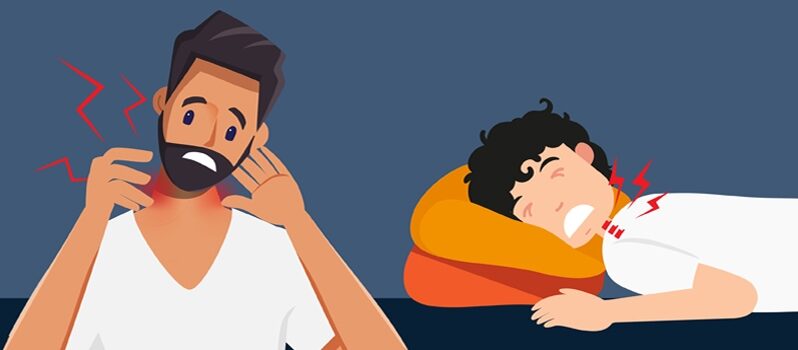Neck pain is a common problem that many people experience. It can be caused by a variety of factors, such as poor posture, stress, and anxiety. If you are experiencing neck pain because of your anxiety, don’t worry – you’re not alone! In this blog post, we will discuss the causes of anxiety and neck pain and how to treat it. We will also provide some tips for preventing neck pain from developing in the first place.
Contents
What Is Anxiety Neck Pain?

There are many different types of anxiety disorders, and each one can cause different symptoms. Some of the most common anxiety disorders include generalized anxiety disorder (GAD), social anxiety disorder (SAD), and panic disorder. People who suffer from GAD often experience feelings of excessive worry or stress. Those with SAD may have a fear of social situations, while those with panic disorder may experience sudden and intense episodes of fear or anxiety.
Anxiety and neck pain often go hand-in-hand because the physical symptoms of anxiety can lead to muscle tension and poor posture. When you’re anxious, your body goes into “fight-or-flight” mode, which causes your muscles to tense up. This can lead to pain in the neck and shoulders. Poor posture can also contribute to neck pain, as can sitting or standing in one position for too long.
If you’re experiencing anxiety and neck pain, it’s important to talk to your doctor or mental health professional.
What Are The Symptoms of Anxiety and Neck Pain?

Anxiety and neck pain can cause several different symptoms, including:
Feeling of Tightness
One of the most common signs of anxiety and neck pain is a feeling of tightness or tension in the muscles. This can lead to pain that ranges from mild to severe. Muscle tightness is often caused by the “fight-or-flight” response, which causes the muscles to tense up when you’re under stress. Also, the poor posture that sometimes accompanies anxiety can contribute to muscle tension.
Headaches
Another common symptom of anxiety and neck pain is headaches. These can be either tension headaches, which are caused by muscle tightness, or migraines, which are a type of headache that is often accompanied by light sensitivity, nausea, and vomiting. These headaches also tend to be more severe than tension headaches.
Pain in the Jaw
Anxiety can also lead to pain in the jaw, which is often felt as a dull ache or tightness. This pain is caused by clenching or grinding of the teeth, which is a common symptom of anxiety. This pain can also be accompanied by headaches, ear pain, and dizziness.
Dizziness
Anxiety can sometimes cause feelings of dizziness or lightheadedness. This is often because anxiety can lead to shallow breathing, which can decrease the amount of oxygen that reaches the brain. Dizziness can also be caused by muscle tension and poor posture.
Constant Fatigue
Anxiety can also cause fatigue. This is often because anxiety can lead to poor sleep, which can leave you feeling tired during the day. Anxiety can also cause physical exhaustion from the constant muscle tension and stress.
Irritabilty
Anxiety can also cause irritability. This is often because anxiety can make it difficult to concentrate, which can lead to frustration. Anxiety can also make you more sensitive to your surroundings, which can lead to feeling easily annoyed or agitated.
Feeling Overwhelmed
Anxiety can sometimes cause feelings of being overwhelmed or out of control. This is often because anxiety can make it difficult to focus on anything other than the worry or stress you’re feeling.
What Are the Causes of Anxiety Neck Pain?

Several different factors can contribute to anxiety and neck pain. These include:
Anxiety Disorders
As mentioned previously, anxiety disorders are one of the most common causes of anxiety and neck pain. People who suffer from conditions such as generalized anxiety disorder (GAD), social anxiety disorder (SAD), or panic disorder often experience physical symptoms such as muscle tension and poor posture. Anxiety and neck pain can also be caused by Obsessive-Compulsive Disorder (OCD), which is characterized by repetitive, intrusive thoughts and behaviors.
Stress
Stress is another common cause of anxiety and neck pain. Also, Stress can be caused by several different factors, including work, family, and personal relationships. Stress can lead to muscle tension and poor posture, which can contribute to neck pain. Also, the “fight-or-flight” response that is triggered by stress can cause the muscles to tense up, which can also lead to neck pain.
Posture
As mentioned previously, poor posture is often a symptom of anxiety. Also, Poor posture can be caused by several different factors, including muscle tension, slouching, and hunching over. Poor posture can lead to neck pain, headaches, and fatigue. Poor posture can also make it difficult to breathe, which can trigger anxiety.
Muscle Strains
Muscle strains are one of the most common causes of neck pain. Also, Muscle strains occur when the muscles are overworked or injured. This can be caused by lifting heavy objects, sudden movements, or poor posture. Muscle strains can lead to pain, stiffness, and inflammation.
Arthritis
Arthritis is a condition that causes inflammation of the joints. There are several different types of arthritis, but the most common type is osteoarthritis. Arthritis can cause pain, stiffness, and swelling in the joints. Arthritis is often seen in older adults, but it can also be caused by injury or overuse.
Disc Problems
Disc problems are another common cause of neck pain. The discs are the cushions between the vertebrae in the spine. Discs can herniate, bulge, or rupture, which can cause pain, numbness, and weakness. Disc problems are often seen in older adults, but they can also be caused by injury or overuse.
How Can Anxiety Neck Pain Impact Your Life?
The impacts of anxiety and neck pain can be far-reaching, affecting different areas of your life, such as:
Work
One of the most common places anxiety can present itself is at work. If you’re constantly worrying about a project or presentation, it can lead to tension in your neck and shoulders. This can then lead to physical pain, which can make it difficult to concentrate on your work. Sometimes the world gets impacted by the change in atmosphere and the person may face neck pain.
Home life
Anxiety can also affect your home life. If you’re constantly worrying about things, it can be difficult to relax. This can lead to tension in your neck and shoulders, which can then cause physical pain. It can also make it difficult to get a good night’s sleep, as anxiety can cause racing thoughts that make it hard to fall asleep. Also, research has found that anxiety can worsen pain perception, meaning that the pain you’re feeling may be worse than it is.
Relationships
Anxiety can also take a toll on your relationships. If you’re constantly worrying about things, it can be difficult to focus on spending time with loved ones. This can lead to tension in your neck and shoulders, which can then cause physical pain. It can impact the quality of your relationships as well as the quantity, as you may not be able to spend as much time with loved ones if you’re dealing with anxiety and neck pain.
Physical Activity
If you’re an active person, anxiety and neck pain can also impact your physical activity. The pain can make it difficult to do certain activities, such as running or lifting weights. It can also lead to tension in your neck and shoulders, which can then cause physical pain. This can then make it difficult to stay active, as you may not want to do any activities that could worsen your pain.
Treatment of Anxiety Neck Pain

Treating anxiety and neck pain can be tricky. The first step is to address the anxiety itself. This may involve therapy, medication, or a combination of both. Once the anxiety is under control, the neck pain often improves on its own. If not, several different treatments can help.
These treatment methods are:
Medications
One of the most common treatment methods for neck pain is medication. Over-the-counter options like ibuprofen and acetaminophen can help to reduce pain and inflammation. If over-the-counter medications aren’t enough, your doctor may prescribe stronger options like muscle relaxants or opioids.
Another medication option is injections. These can be corticosteroid injections, which help to reduce inflammation, or nerve blocks, which help to temporarily numb the pain.
Physical Therapy
Physical therapy is often recommended for neck pain. A physical therapist can teach you exercises and stretches to help alleviate pain and improve your range of motion. They may also use massage, heat, or cold therapy to help relieve pain.
Surgery
In some cases, neck pain may require surgery. This is usually only necessary if the pain is caused by a herniated disc or other serious condition. Surgery is usually the last resort after other treatment methods have failed.
Some types of surgery are:
Discectomy: This involves removing a herniated disc that is pressing on a nerve.
Spinal fusion: This surgery fuses two or more vertebrae in the spine.
Laminectomy: This surgery removes a portion of the bone that covers the spinal cord.
How Ro Prevent Anxiety Neck Pain?

Preventing anxiety and neck pain is possible by managing stress and anxiety levels. Ways to manage stress and anxiety include:
Exercise
One of the most important things you can do to prevent anxiety and neck pain is to get regular exercise. Exercise releases endorphins, which have mood-boosting and pain-relieving properties. Some of these exercises are also great for neck pain:
1. Doing some light cardio like walking, jogging, or swimming.
2. Try some yoga or Tai chi moves to help improve your flexibility and range of motion in your neck.
3. Strength-training exercises can help build up the muscles in your neck so they can better support your head and relieve pain.
Talk to a Therapist
If you’re struggling with anxiety, one of the best things you can do is talk to a therapist. A therapist can help you understand your anxiety and give you tools to deal with it. They can also help you learn how to manage stress and prevent anxiety and neck pain.
Meditation and Relaxation Techniques
Meditation and relaxation techniques can help you calm your mind and body. These techniques can also help you manage pain by teaching you how to focus on something other than your pain.
1. Try some deep breathing exercises.
2. Listen to calming music or nature sounds.
3. Take a hot bath or use a heating pad on your neck.
4. Practice progressive muscle relaxation, where you tense and relax different muscle groups in your body one at a time.
Acupuncture
Acupuncture is a traditional Chinese medicine technique that involves placing thin needles into the skin at specific points on the body. Also, Acupuncture is thought to stimulate the release of endorphins and help relieve pain. It’s also been shown to be effective in treating anxiety and neck pain. Accupressure is a similar technique that uses pressure instead of needles.
Get a Massage
A massage can help relieve neck pain by improving blood flow and loosening muscle tension. It can also help reduce stress and anxiety, which can lead to neck pain.
Try Some Herbal Remedies
Many herbal remedies are thought to be effective in treating neck pain. Some of these remedies include:
1. Arnica: Arnica is a flower that’s been used for centuries to treat pain and inflammation. It’s available in cream or gel form and can be applied to the skin.
2. Chamomile: Chamomile is a plant that’s often used as an herbal tea. It’s thought to have calming properties and can help treat anxiety and neck pain.
3. Kava kava: Kava kava is a plant that’s native to the Pacific Islands. It’s commonly used as an herbal tea and is thought to have sedative effects.
4. Lavender: Lavender is a plant that’s often used in aromatherapy. It’s thought to have calming and relaxing effects, which can help reduce anxiety and neck pain.
5. Peppermint: Peppermint is a plant that’s often used in aromatherapy or as an herbal tea. It’s thought to have cooling and soothing effects, which can help relieve neck pain.
Use Heat or Ice
Applying heat or ice to your neck can help relieve pain. Ice can help reduce inflammation, while heat can help loosen muscle tension. Try alternating between ice and heat every 20 minutes.
Practice Good Posture
One of the best things you can do to prevent anxiety and neck pain is to practice good posture. This means keeping your head up and your shoulders back. It’s also important to avoid slouching or hunching over. When you’re sitting, make sure your chair supports your back and that your computer screen is at eye level. Take breaks often to walk around and stretch your neck and shoulders.
Conclusion
Anxiety and neck pain can be a real pain, but it doesn’t have to be. If you’re struggling with anxiety and neck pain, there are a few things you can do to ease your symptoms. First, try to identify your triggers and manage your stress levels. If you’re still experiencing neck pain, talk to your doctor about other treatment options. With the right approach, you can find relief from both anxiety and neck pain.
If you’re struggling with anxiety and neck pain, you’re not alone. Anxiety is the most common mental health disorder in the world. And neck pain is the second most common type of pain.
Hope this article was of help to you! If you are suffering from mental health disorders, you may seek help from Therapy Mantra. We have a team of highly trained and experienced therapists who can provide you with the tools and skills necessary for overcoming mental health disorders. Contact us today to schedule an online therapy or download our free Android or iOS app for more information.


